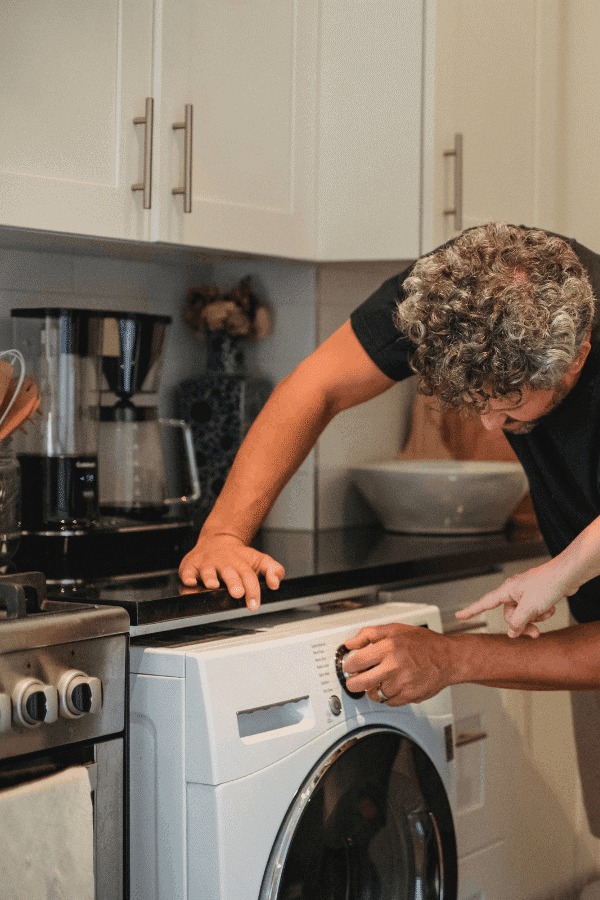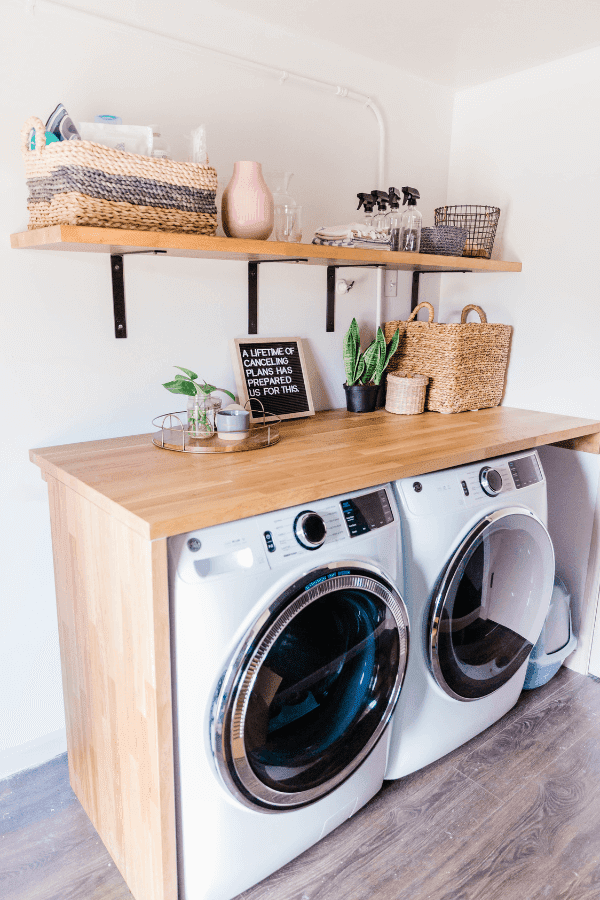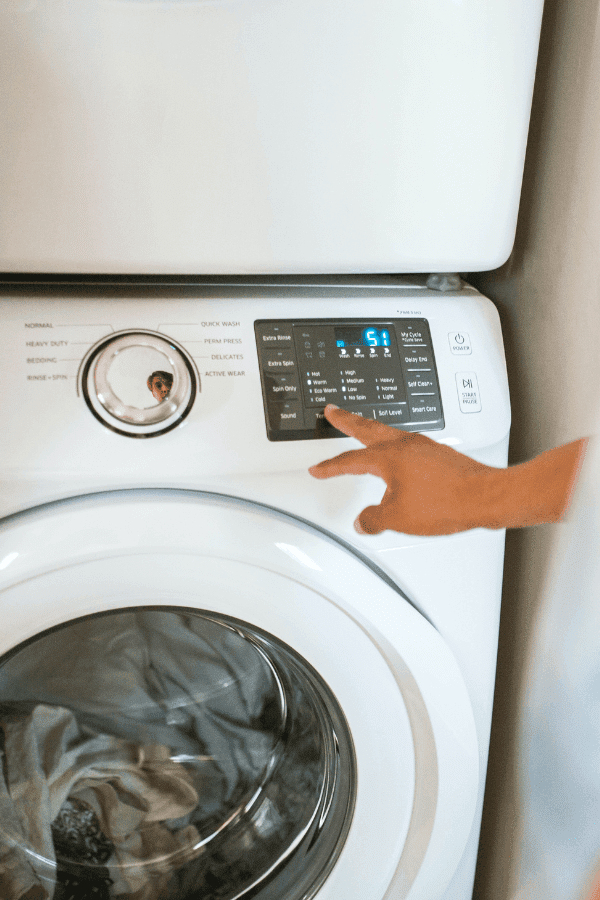If you have a pile of washing to work though and you begin to hear the dreaded grinning noise try not to fear the worst as there are lots of common noises made by washing machines.
Instead of rushing to look at the cost of a replacement washing machine, you can take a look at our guide to the most common noises washing machines make and what to do if you hear a grudging noise.
When you understand where a noise is coming from within your washing machine you may be able to fix it, whether by yourself or via a tradesperson.
One of the most common noises in washing machines is caused by the agitator due to a worn-out drum bearing or a damaged drive pulley. We talk you through what you need to do when you hear this noise before ordering a full replacement.
As an Amazon Associate, I earn from qualifying purchases. The links below may be affiliate links. Please read my disclosure policy for more information.

Common Washing Machine Noises
As we have said, there are many reasons why your washing machine may be making a noise. When you hear a noise there are lots of ways that you can try to fix the problem before calling an engineer or buying a replacement machine.
You must take action on any banging noise so that the problem does not get worse and cause a lot of damage.Take a look at our rundown of common noises washing make and what to do about it.
Banging
A banging or clanking noise indicates a problem with the drum. The issue may be innocent, with harder items of clothing, such as zippers and hoodie strings banging around as the clothes get washed.
However, there could be items such as broken buttons and loose change left in clothes getting stuck in the door seal or the lint trap.
If loose items find their way behind the drum seal then it will clatter loudly between the drum and the tub, particularly when the cycle enters full spin mode.
You will not be able to stop the cycle if it has already started and the machine has loaded with water but be sure to remove any items from the drum before you load your next lot of waste.
Leaving items such as money, buttons, and bra wires in the drum can lead to lasting damage to the drum or your washing machine flooding.
Clicking
If you hear a clicking noise coming from your washing machine you may have a faulty water inlet valve or it could be fully broken. The valves are prone to rust and blockages and the first sign of this issue, aside from clicking, is the machine stops filling with water.
Grinding
Grinding noises from your washing machine are, more often than not, caused by putting too much clothing in at once. Overloading the drum will result in a grinding noise when the spin reverses direction.
If you hear this type of sound there is nothing to worry about, you should simply reduce your washing loads so as not to cause long-term damage. If the problem persists even when you have less washing in the machine, then it could be the result of the drum bearing rusting.
The bearing holds the drum in place offering support so that it can rotate effectively. Another problem that causes grinding is when the driver pulls is faulty. You can test if this is the issue by manually rotating the drum to see if that also makes the grinding noise.
Squealing
If your washing machine is making a squealing noise as it fills with water it could indicate an issue with the water pressure. You should check that the water pressure that supplies the washer is not too high.
Noise During Spin Cycle
If your washing machine is, taking a noise during the spin cycle then it is most likely due to items caught in the seal, lint trap, or between the drum and the washing machine casing.
Noise During Agitation
If you are experiencing noise from your washing machine while it is in the agitation cycle it is possibly a worn drum bearing or a faulty drive pulley. Both of these users will cause a grinding and/or rumbling noise.

7 Reasons Why Your Washing Machine is Grinding
Grinding is one of the main issues when it comes to washing machine noises. While a grinding noise during agitation is a major concern for many there are other reasons why you may be hearing a grinding noise.
There are lots of reasons why washing machines make a loud noise during agitation, some of which are easily fixed and others that will require maintenance as there is a faulty part.
We take a look at 7 of the most common reasons your washing machine is making loud girding noises.
1. Agitator dogs are slipping
There is a component in your washing machine known as an agitator dog that enables it to rotate. The agitator dogs are located in the center column of the agitator towards the top. Once the washing machine enters heavy use the agitator dogs may experience wear and tear and begin to slip which can create a grinding noise.
2. Drive pulley strain or damage
If your washing machine has a worn-out drive pulley you will begin to hear a grinding noise. Detaching the bully from the machine can easily show if there are signs that you fully is worn down.
3. Motor control board defective
If a washer is unable to agitate effectively it will make a noise and, often, the motor control board is the first place an engineer will look. If there are any signs of a problem with the motor control board then it will need to be fixed or replaced.
4. Tub-bearing kit
If the tub bearing is not working affecting them. A grinding noise will appear. If the tub bearing kit is defective it will most likely need replacing.
5. U-joint failure
The U-joint is a key component of the washing machine agitation system as it is the main mechanism that starts up the process. This part can cause a noise it breaks but it can be easily fixed. If, however, you need a replacement then a washing machine engineer would need to fit it for you.
6. Stator Assembly glitch
When the stator assembly malfunctions there will be a loud grinding noise during agitation. This part is responsible for the electromagnetic connection with the machine tub and any error code can indicate a failure within the agitation system. It may, indeed, be an agitator failure but it could also be that it is simply a glitch in the stator assembly.
7. Motor coupling wear
The motor coupling acts as a bridge between the motor and the water supply. If the coupling is worn or rusty it may not work and the washing machine may begin to overload with water causing a slow and noisy agitation process.
It Is worth noting that your washing machine may not have anything wrong with it as many machines will make noise as they are going through a cycle.
Some washing machines are noisier than others and one machine will make a noise as the agitator switches direction during its cycle. Other machines, such as GE machines, will make a grinding noise as the cycle starts up.

How to Rid Grinding Noises During Washing Machine Agitation?
If you have checked your drum for any loose change, bits of clothing, such as bra wires or zippers, or any other debris, and there is still a grinding noise then the noise is likely to be due to one of the above issues. If you find that it is one of the most common causes of grinding you can take the below steps to resolve the issue.
Check the motor and the pump
A full-deal clean of the pump can be a quick and easy fix to your gridding noise. You can fix the pump as per the steps below:
- Unplug the washing machine from its electrical supply.
- Unplug the front panel then plug the machine back in and start it up to see if the noise appears without the pump
- If there is no noise then you know that it is the pump that is at fault
- Remove the inlet hose and look for signs of dirt.
- Clean with a cloth and soapy water or a distilled vinegar cleaning solution
- Replace the pump if there are signs of cracks
[amazon box=”B01MTY6ZRA” template=”vertical”]
Check the shock absorbers
The shock absorbers are another common area to check when looking to solve grinding noises in a washing machine. You will need to take the following steps to check for signs of wear or damage on the absorbers:
- Unplug the washing machine and locate the shock absorbers (usually in the front but some models put them in the rear)
- Look out for signs of tears in the absorbers, loose absorbers, or absorbers leaking fluid
- Any faulty absorbers need will need an experienced washing machine engineer to fix or replace it
Investigate the drive motors
The last component that you are likely to need to asses is the drive motor as it can often malfunction due to either the motor itself or the two parts that drive the motor.
If the motor does not function easily then it can deliver a grinding noise. You should check that there is no debris stuck in the spinning parts of the washing machine or the capacitor is not swollen. This issue may be something that you need to book an engineer to fix.



